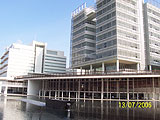Concrete Technology Today – Vol 7 – No 1 2008
Kryton’s new concrete waterproofing technology, Integral Crystalline Waterproofing (ICW) has been used at Republic Polytechnic’s Woodlands Campus in Singapore. This innovative technology creates a chemical reaction within concrete that causes crystals to form and grow, filling the spaces between concrete particles and permanently blocking water.
BACKGROUND
Established in 2002, Singapore’s Republic Polytechnic is a post-secondary institution that prepares local and international students for careers in engineering, technology and applied sciences. In 2004, work began on the institution’s new home, the Woodlands Campus, which was aimed to serve thousands of students and community members.
 |
|
Kryton’s Integral Crystalline Waterproofing technology was applied on the Agora, one of the large elliptical concrete decks of the common facilities. |
The 20 ha campus is made up of a central nucleus containing I I identical, high-rise learning pods and one staff administration hub. The learning pods, which include laboratories and study areas, are linked by two large, elliptical concrete decks of common facilities.
The Agora houses a library, auditoriums, lecture rooms, cafeterias and informal reading and recreation spaces. The Lawn features a grassy area, a sunken garden and various landscaped spaces.
In planning the Woodlands Campus, waterproofing the suspended concrete slabs that make up the Lawn and the Agora was a key concern for the project team. Water leaking through the slabs could flood the laboratories, restaurants and classrooms beneath, and accessing the concrete beneath the Lawn for repairs could tear up the grass and landscaping.
Since addressing future leaks in the Lawn or the Agora could be costly, time-consuming and inconvenient to students. staff and the public, the team needed a concrete waterproofing system that was permanent. And in light of the project’s tight construction timeline, the system needed to be easy and quick to apply.

SOLUTION
After investigating various concrete options, the project team chose Krysto Internal Membrane (KIM) to waterproof the suspended slabs of the elliptical decks that make up the Agora and the Lawn. A sunken courtyard and an Olympic-sized swimming pool were also waterproofed using KIM. The product was supplied by Kryton’s local distributor Lee Construction Pte Ltd.
 KIM is based on integral crystalline waterproofing technology. When added to a concrete mixture or applied to existing concrete, the crystalline chemicals are absorbed into the concrete by capillary action and diffusion. Once inside the concrete, the crystalline chemicals begin growing crystals and fill the spaces between concrete particles.
KIM is based on integral crystalline waterproofing technology. When added to a concrete mixture or applied to existing concrete, the crystalline chemicals are absorbed into the concrete by capillary action and diffusion. Once inside the concrete, the crystalline chemicals begin growing crystals and fill the spaces between concrete particles.
As long as moisture remains present, the crystals continue to grow throughout the concrete, reaching lengths of many centimeters over time. Once the concrete has cured, the crystalline chemicals sit dormant until another dose of water, such as through a new crack or rising water table, causes the chemical reaction to begin again.KIM is based on integral crystalline waterproofing technology. When added to a concrete mixture or applied to existing concrete, the crystalline chemicals are absorbed into the concrete by capillary action and diffusion. Once inside the concrete, the crystalline chemicals begin growing crystals and fill the spaces between concrete particles.
The ability to reactivate in the presence of water gives the crystalline-treated concrete the ability to ‘self-seal’. When cracks form due to curing shrinkage, settling on seismic activity, water entering through them causes new crystals to form and grow, blocking and filling the cracks. Self-sealing is one of crystalline technology’s most unique and useful features, and can help to significantly reduce the longterm maintenance and repair costs of a concrete structure.
KIM is also resistant to physical damage and deterioration. With a head pressure of up to 140 in, it is also effective against hydrostatic pressure.
KIM product is usually supplied as an easy-to-use, dry powder comprising Portland cement, silica sand and special chemicals that can simply be added to the ready mix truck at the plant or jobsite to create a powerful moisture barrier in slabs and walls. There is no need for surface application at the construction site, as the product can be simply added to the concrete.
More than 60,000 kg of KIM and 7,500 cu m of KIM-treated concrete was used in the new Republic Polytechnic campus, which opened in March 2006.
The project was designed by award winning architect Fumihiko Maki and DP Architects. The main contractor for the project is China Contractor – Taisei JV and the engineer is Meinhardt (Singapore) Pte Ltd.